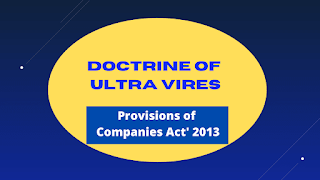Doctrine of Ultra Vires
Consequences and Exceptions
Provisions of Companies Act Act' 2013
Company Law Notes for BCom, BBA and MBA
Doctrine of Ultra vires
The word Ultra means beyond and vires means
powers. So, simply Ultra vires means any act of the company outside the scope
of memorandum of association. An act is said to be ultra vires when it is
performed, is not authorised by the object clause in the memorandum of
association. The Companies Act requires that the memorandum of every company
must state the object of the company. The objects must be legal and not be
against the provision of the companies Act, 2013. The object clause requires
that every the company must devote itself only to the objects set out in the
memorandum. Thus memorandum fixes the area beyond which a company cannot
operate. Any activities beyond the object clause of the company are ultra vires
the company. Such an act is void and cannot be ratified even by unanimous
resolution of all the shareholders. But any act is ultra vires the articles, it
can be ratified by altering the articles by passing a special resolution in the
general meeting.
The main purpose of this doctrine is to
protect the interest of the shareholders. They are assured that their
investment is not spent on activities which are authorised by the memorandum of
association. Also it safeguards the interest of the creditors as the property
of the company cannot be diverted to unauthorized objects.
Consequences/Effects of Doctrine of Ultra vires
a)
Void ab initio: The ultra vires acts are null and void ab initio.
The company is not bound by these acts. Even the company cannot sue or be sued
upon. Ultra vires contracts are void ab initio and hence cannot become intra
vires by reason of estoppel or ratification.
b)
Injunction: The members can get an injunction to restrain a
company wherein ultra vires act has been or is about to be undertaken.
c)
Personal liability of Directors: It is one of the duties of
directors to ensure that the corporate capital is used only for the legitimate
business of the company and hence if such capital is diverted to purposes alien
to the company's memorandum, the directors will be personally liable to replace
it.
d)
Company's money: Where a company's money has been used ultra vires
to acquire some property, the company's right over such property is held secure
and the company will be the right party to protect the property. This is
because, though the property has been acquired for some ultra vires object, it
represents the money of the company.
e)
Borrowing: If company has no borrowing powers or has already
exceeded or borrowings are made for the purpose which is ultra vires, then the
contract of loan is void and no action can be brought under it to recover the
money lent. Ultra vires borrowing does not create the relationship of creditor
and debtor.
f)
Ultra vires torts: A company will be liable for torts or crimes
committed in the pursuit of its stated objects. But a tort or crime committed
in the course of activity which is ultra vires the company, the company would
not be liable.
Exceptions to the Doctrine of Ultra vires
(i)
An act, which is intra vires to the company but outside the
authority of the directors, may be ratified by the shareholders in proper form.
(ii)
If an act is beyond the articles of the company, it can be
approved by altering the company's articles.
(iii)
An act which is intra vires to the company but done in an
irregular manner, may be validated by the consent of the shareholders.
(iv)
If a company loans any money (beyond its authority) to a third
party under a contract of debt, company can sue for the repayment of such loan.
(v)
If a company takes a loan from a third party under a contract
which is beyond its authority and utilises the amount to pay off its business
debts, the party giving such loan to the company is deemed to be a creditor of
the company in place of those creditors to whom payment is made.


Post a Comment
Kindly give your valuable feedback to improve this website.